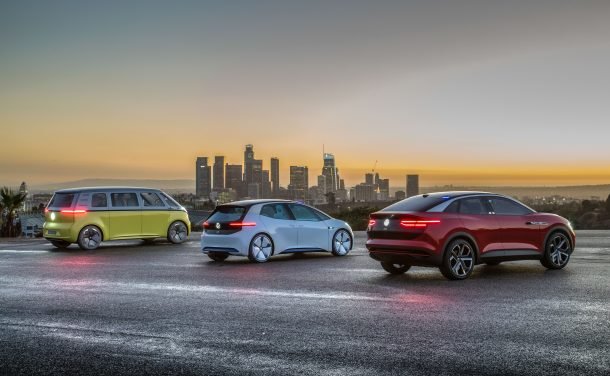You Won't Have to Buy One of Volkswagen's Upcoming Electrics to Drive One

A product onslaught with a questionable sales future is on the way from Volkswagen, but Americans, as well as Europeans, won’t necessarily have to purchase one to add it to their lifestyle.
Under its “We Share” ride sharing venture, Volkswagen plans to offer up its line of I.D. electric vehicles to urbanites who don’t own a car, but still wish to use one from time to time. Users won’t have to worry about a disappearing tax credit, that’s for sure.
The service comes online in Berlin in the second quarter of 2019. Starting out, VW plans to offer 1,500 e-Golfs and 500 smaller, European-market EVs that go by the name “e-up!” (Such names always bring out the rage in us.) In 2020, models from the I.D. family join those earlier electrics in the We Share fleet, as the service expands to other cities.
Like its revenue stream-seeking rivals, VW sees big growth potential in the ride sharing market.
It’s hoped that an early, no-pressure taste of “e-mobility” (aka driving an electric car) will help familiarize the population with the vehicles and their merits. Hopping into a VW EV will be as easy as opening an app on your phone and locating an available car — after paying an undisclosed fee, of course. Down the road, it’s hoped that some of these adopters add an electric VW to their lives full-time.
“We want to motivate young, urban users to engage with e-mobility,” said Jürgen Stackmann, Volkswagen’s brand board member for sales, in a statement. “The people of Berlin will be the first to enjoy the electrifying experience of our ‘We Share’ car sharing offering.”
From there, the automaker plans to roll out the service in other European and North American cities in 2020 — the year the first of the I.D. models enters showrooms. While the initial hatchback I.D. model isn’t expected stateside, others are. Among them, a crossover (I.D. Crozz) and a reborn Microbus (I.D. Buzz), both expected to enter production at VW’s Chattanooga assembly plant. Americans see the Crozz first, in 2020, with the Buzz arriving in 2022.
Managing the ride sharing venture is UMI Urban Mobility International, a VW subsidiary. The automaker claims its North American rollout will “primarily” target cities with populations of over one million.
[Images: Volkswagen]

More by Steph Willems
Latest Car Reviews
Read moreLatest Product Reviews
Read moreRecent Comments
- Calrson Fan Jeff - Agree with what you said. I think currently an EV pick-up could work in a commercial/fleet application. As someone on this site stated, w/current tech. battery vehicles just do not scale well. EBFlex - No one wanted to hate the Cyber Truck more than me but I can't ignore all the new technology and innovative thinking that went into it. There is a lot I like about it. GM, Ford & Ram should incorporate some it's design cues into their ICE trucks.
- Michael S6 Very confusing if the move is permanent or temporary.
- Jrhurren Worked in Detroit 18 years, live 20 minutes away. Ren Cen is a gem, but a very terrible design inside. I’m surprised GM stuck it out as long as they did there.
- Carson D I thought that this was going to be a comparison of BFGoodrich's different truck tires.
- Tassos Jong-iL North Korea is saving pokemon cards and amibos to buy GM in 10 years, we hope.



































Comments
Join the conversation
I hear VW is working on a fusion powered model they plan to call the F-up.
Speaking of names that REALLY didn't sell: American Motors Pacer Gremlin American Motors Hornet Javelin American Motors